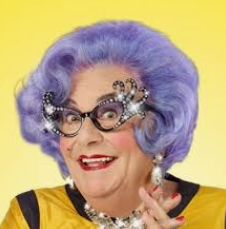 It may be argued that audiobooks should not substitute for reading, and authors—contrary to common conception—seldom are the best narrators of their own work. On the other hand, as the firstperson narrative constitutes an inherent aesthetic property of the audiobook as a unique performance-based aural artefact, the audiobook versions of autobiographies can potentially amplify one's aesthetic experience of a written personal history. Nonetheless, rather than focusing on so-called 'standard' autobiographies, this essay attends to the aural iterations of Barry Humphries's pseudoautobiographical writing. Overall, the aesthetic complexity in Humphries's work is virtually labyrinthine and borderline-surreal. While there surely prevail far more complex first-person narratives, the complexities in Humphries's case stem from the texts' incarnation as audiobooks, putting into question not only the identity of the narrating protagonists, but also their very (non)existence. They simultaneously exist as commonplace works of fiction written by Humphries, and as the quite literal memoirs of Humphries's ownfictional characters. They thus raise the question whether certain audiobooks might in fact negate the original printed work.
It may be argued that audiobooks should not substitute for reading, and authors—contrary to common conception—seldom are the best narrators of their own work. On the other hand, as the firstperson narrative constitutes an inherent aesthetic property of the audiobook as a unique performance-based aural artefact, the audiobook versions of autobiographies can potentially amplify one's aesthetic experience of a written personal history. Nonetheless, rather than focusing on so-called 'standard' autobiographies, this essay attends to the aural iterations of Barry Humphries's pseudoautobiographical writing. Overall, the aesthetic complexity in Humphries's work is virtually labyrinthine and borderline-surreal. While there surely prevail far more complex first-person narratives, the complexities in Humphries's case stem from the texts' incarnation as audiobooks, putting into question not only the identity of the narrating protagonists, but also their very (non)existence. They simultaneously exist as commonplace works of fiction written by Humphries, and as the quite literal memoirs of Humphries's ownfictional characters. They thus raise the question whether certain audiobooks might in fact negate the original printed work.